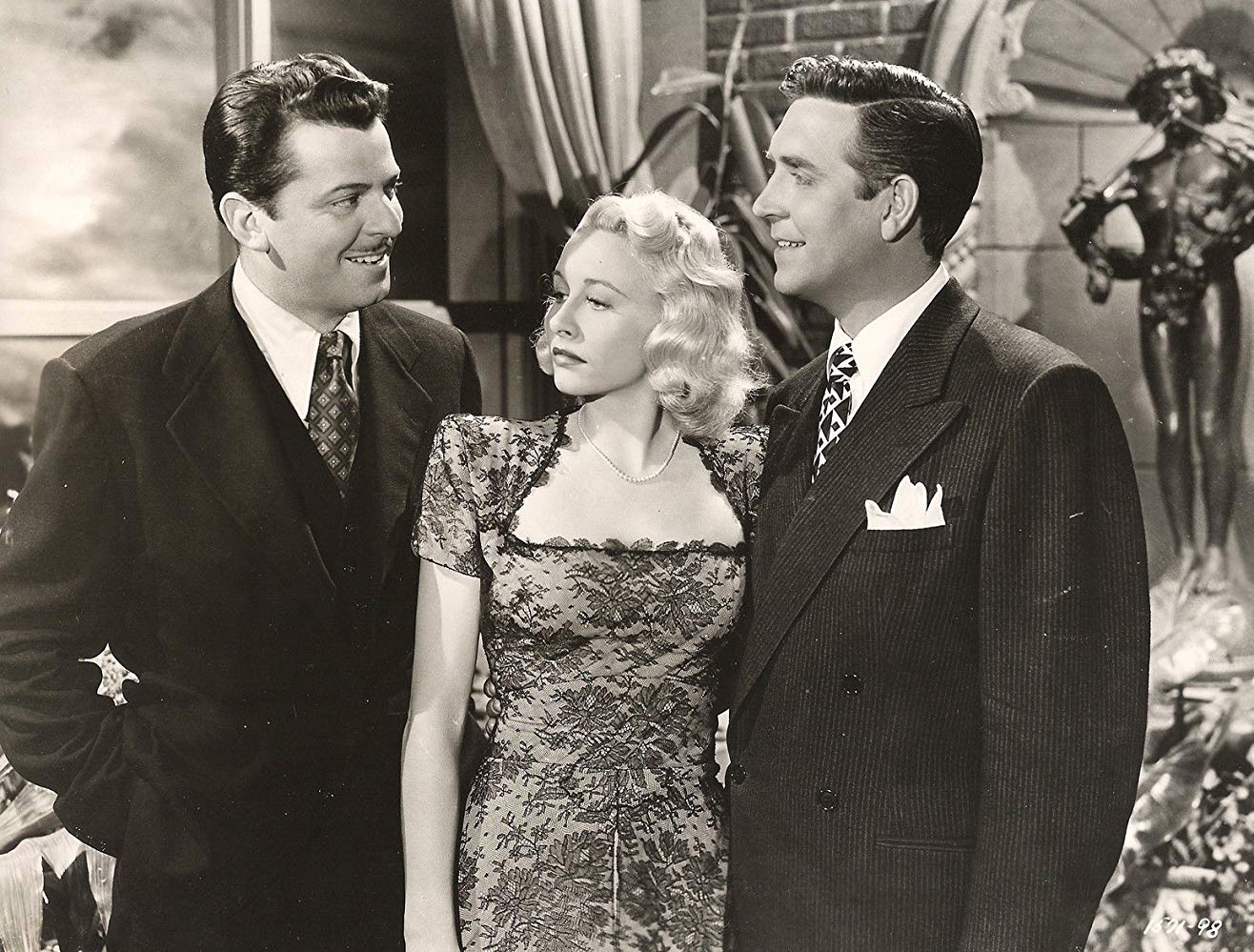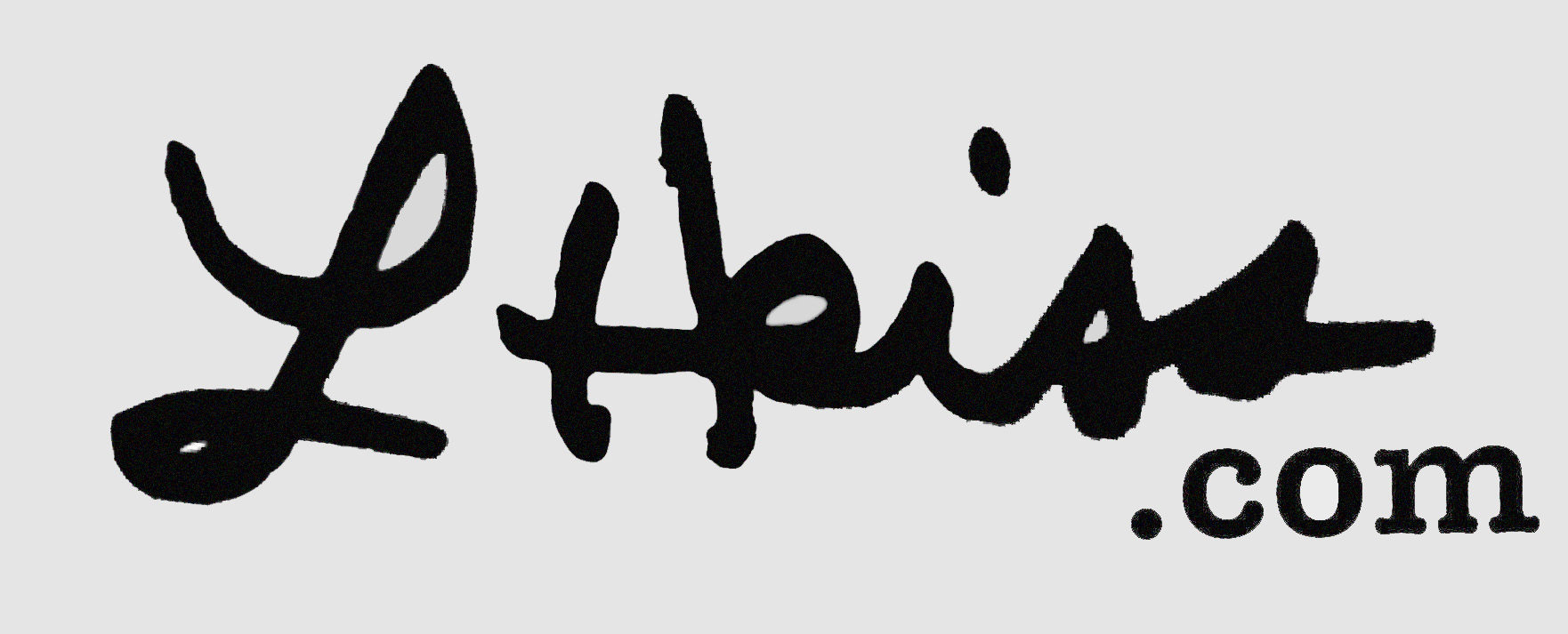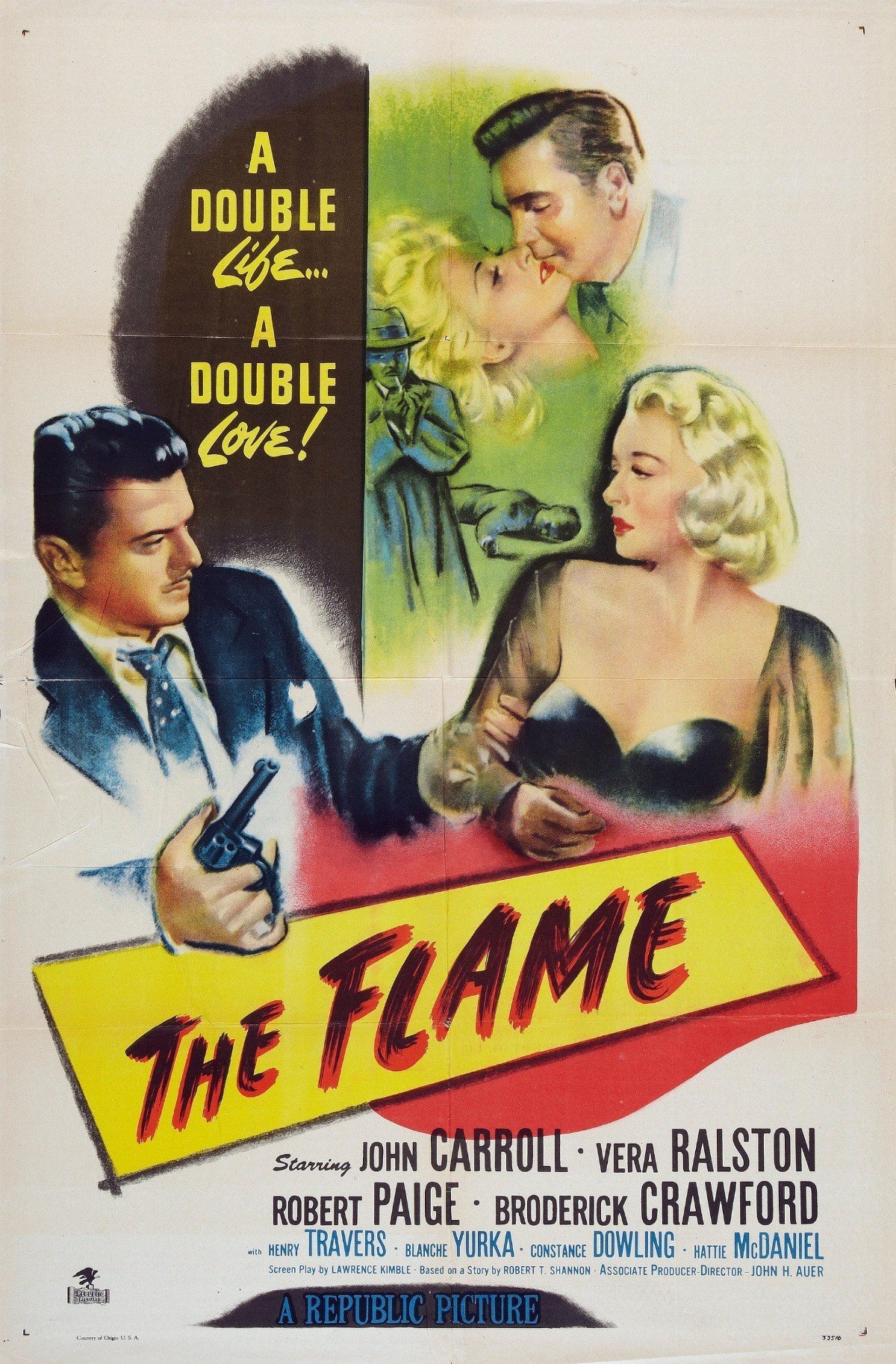
Judge Noir Decides: Noir or Not?
The Flame (1947) directed by John H. Auer
Does Film Noir become “Camp Noir” in this Vera Ralston vehicle?
The plot:
George McAllister (John Carroll), a profligate spendthrift, is jealous of his half-brother Barry McAllister, who has the lion’s share of the family inheritance. But Barry is ill and probably going to die in a few months. Angry at Barry’s success especially measured against his own failures, George hatches a plan: He succeeds in getting his girlfriend Carlotta (Vera Ralston) hired as a nurse to live in the family mansion and take care of his brother. His family doesn’t know that she and George have a history together, and when Barry falls in love with her, no one suspects that it’s all a scheme for George getting back the family fortune after Barry dies.
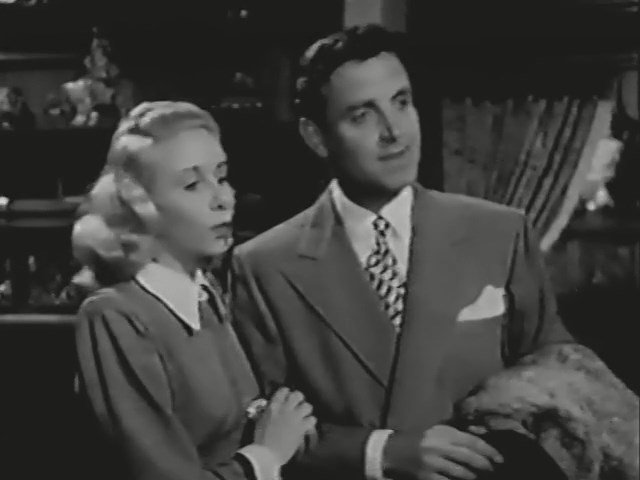 But after Carlotta marries Barry, it doesn’t take her long to realize he is a much better person than George and she falls in love with him. While all this is going on, George is having an affair with Helen (Constance Dowling) a woman who lives down the hall in his apartment building, and when her jealous ex-boyfriend Ernie (Broderick Crawford) tails George he learns about the scheme involving Carlotta marrying George. Before long, he threatens George with blackmail, putting his entire ‘long con’ into danger.
But after Carlotta marries Barry, it doesn’t take her long to realize he is a much better person than George and she falls in love with him. While all this is going on, George is having an affair with Helen (Constance Dowling) a woman who lives down the hall in his apartment building, and when her jealous ex-boyfriend Ernie (Broderick Crawford) tails George he learns about the scheme involving Carlotta marrying George. Before long, he threatens George with blackmail, putting his entire ‘long con’ into danger.
When I see a film for the first time, I try to watch it before reading any reviews or descriptions of the film, so my impressions are not influenced by other opinions. When I first saw The Flame, I knew nothing of the backstory concerning one of the lead actors in this film.
And those who read my reviews will note that I rarely say anything negative about actors – to paraphrase Shakespeare, I look to be entertained by accepting their limits. The best actors are still nothing more than shadows on the screen, and the worst are no worse if my imagination can amend them.
But William Shakespeare never met Vera Ralston. Twenty minutes into this film, I was thinking: What director did she date to get this role? Forty minutes into the film, I was thinking: What studio executive did she marry to get this role? (Later that night after the film was over, I learned the answer to my question: She married the head of Republic Pictures, Herbert J. Yates!)
I didn’t know about the Yates connection until afterward, so I spent the rest of the film puzzling out Ralston on her own terms. In real life, Ralston must have been a beautiful woman, but on a 40 foot screen, any imperfections are magnified to the extreme, and after watching her lit from every conceivable position I decided that her face defied any system of lighting: a view that made one feature of her face look good made another feature look unfavorable.
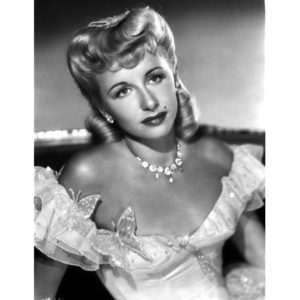 Having a non-photogenic face is not a deal-breaker since a lot of actors have similar challenges – one makes up for less-than-perfect looks by throwing into the performance something more important, such as charisma, gravitas, or personality. But if Ralston had any ‘personality,’ it was of a non-professional actor who has wandered on to the set from a skating rink, which isn’t far from what happened (Ralston was a skater for the Czech team and competed in the Olympics).
Having a non-photogenic face is not a deal-breaker since a lot of actors have similar challenges – one makes up for less-than-perfect looks by throwing into the performance something more important, such as charisma, gravitas, or personality. But if Ralston had any ‘personality,’ it was of a non-professional actor who has wandered on to the set from a skating rink, which isn’t far from what happened (Ralston was a skater for the Czech team and competed in the Olympics).
The irony of this double-whammy (unusual facial features + lack of emotive skils) is that in her unique way, she commands the screen – you can’t take your eyes off her. It’s instant camp. Warhol would have loved her.
And to be fair, Ralston can project one emotion. let’s call it ‘scared sincerity’ – and that one emotion comes to us loud and clear. The ‘scared’ part is because Ralston’s native language is Czech and in The Flame, she speaks her lines with a fearful precision, perhaps deathly afraid that her Czech accent will find itself into the English words thus betraying her to an audience that she is a foreigner and not right for the role.
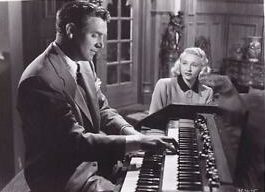
To give Ralston more credit, this single emotion of scared sincerity is one more emotion than her costar, Robert Paige can muster up. Paige had a long and serviceable career as a leading man in B pictures from 1938 to 1946, but in this film, he seems unmoored from the rest of the story. Perhaps not getting much help from journeyman director John Auer was part of the problem, or maybe he had his issues with Ralston, in any case, Paige floats through this picture like a film noir Korla Pandit, playing the organ and disengaged from the other actors. It’s an odd – perhaps unintentional – acting choice and another turn toward what would be later called camp.
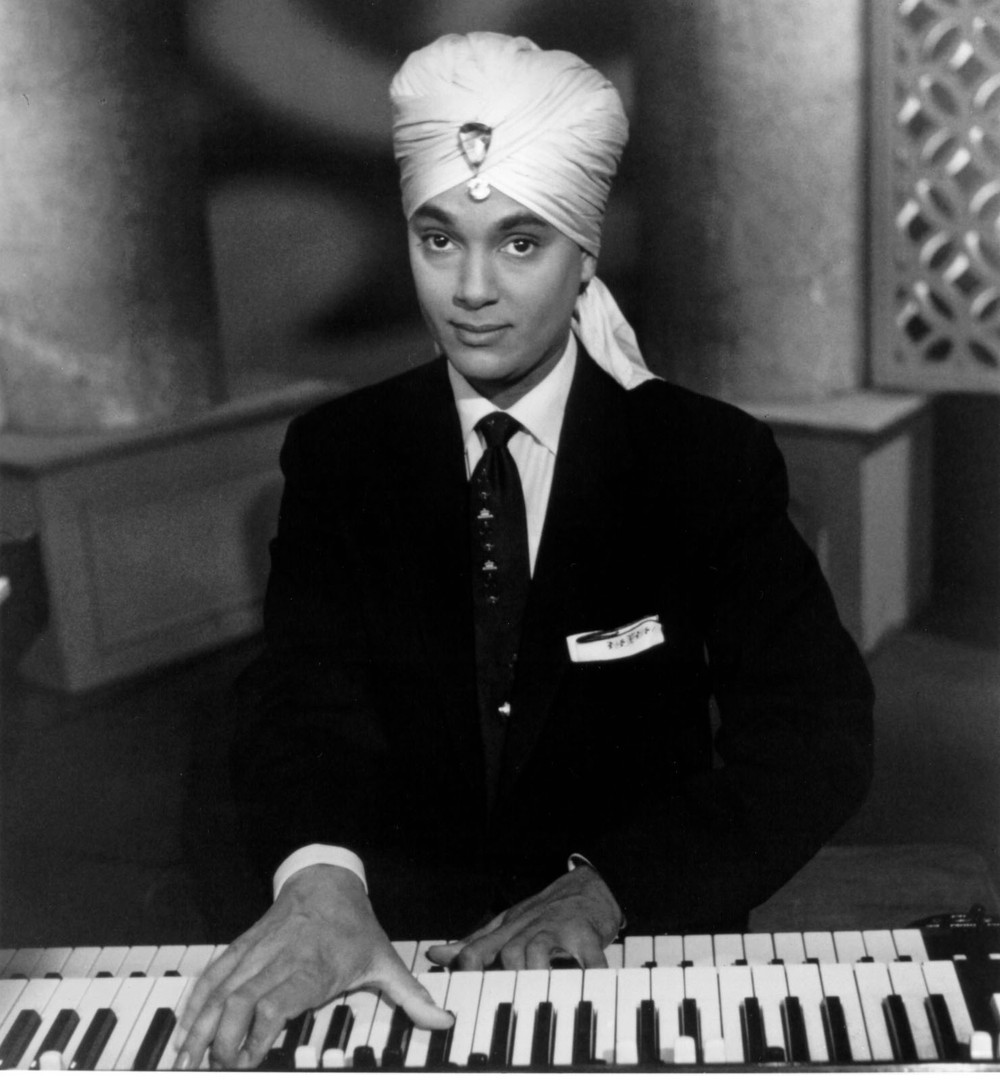
Korla Pandit, a celebrity organist active in the noir era, also known as the “Godfather of Exotica.”
Despite of these major distractions (so major they constantly threaten to take over the viewer’s interest), The Flame is a good noir, with a literate script and otherwise good acting, especially Broderick Crawford, who you know is going to be 400 pounds of trouble from the moment you see him. The film takes a brief detour from the world of noir when Ralston’s character enters a church and ‘gets religion,’ realizing that her marriage of fraud is now a marriage of love. But with this detour over, the film returns to the flinty dark place that is the heart of noir, just in time for a cold and ruthless finish.
Item List: George wears a pinky ring through the entire film, broadcasting to the world his prodigal ways. Carlotta (Vera Ralston) is oblivious to this clue. Perhaps pinky rings are not part of an Olympic skater’s basic education.
Deep Structure: This is a doppleganger film all the way, with George McAllister, and half-brother Barry McAllister playing the bad and good sides of what is essentially the same character.
Judge Noir Decision: This film is from the classic noir era and has all the usual noir tropes, except for a femme fatale that turns out to be a femme vivant (when she gets religion), and in the oddest turn of all, ends up being played by a ‘femme non-actrice.’
Decision: Solid Noir, but with definite camp elements. Could we call this film ‘Camp Noir’?
